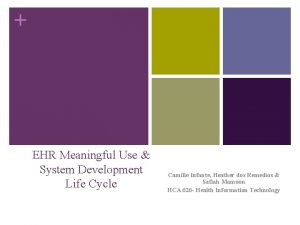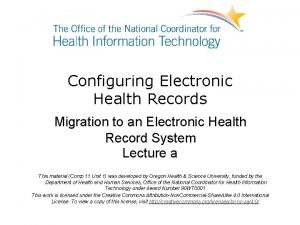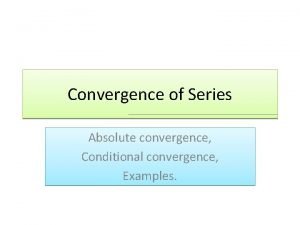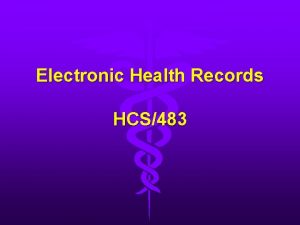Electronic Health Records Convergence and Divergence with Patient









- Slides: 9

Electronic Health Records: Convergence and Divergence with Patient. Centered Care Michael Raddock, MD. Department of Family Medicine Metro. Health Medical Center Cleveland, Ohio

Electronic Health Records as Tools � The EHR is a relatively new tool that is in a state of evolution and is changing based on the priorities of the designers and buyers of these systems as well as payers and regulatory entities. � Like any tool, the EHR will have strengths and weaknesses depending on it's design as well as the skill and experience of the users.

Incentives and Priorities � Many EHRs are currently optimized for billing, coding, capture/analysis/display/retrieval of granular data. � EHRs are part of health care systems that further influence their optimization and use. � Financial incentives from the government such as Meaningful use and Patient Health Quality Reporting influence the design and prioritization of EHRs. � Insufficient input from clinicians and patients

Convergence and Divergence � There areas of convergence and divergence when one looks at the priorities of purchasers, payers, and designers of EHR’s, as well as those of clinicians and the patients. � Patients and clinicians may want systems that are optimized for: strengthening patientclinician relationships, fostering co-created narratives, communication, collaboration, and patient self-efficacy.

What do Clinicians want in an EHR? � It depends on the clinician and the situation! � Optimized for relationship building, improving patient engagement and efficacy, making administrative/documentation easier. � Optimized for images (dermatologists) � Optimized for granular data capture, retrieval, and analysis (quantitative researchers)

What do Patients want in an EHR? � To help their providers and health systems to keep track of their information reliably � To have information more easily shared among providers and facilities � To help avoid mistakes � To help them feel heard and valued as individuals � To help them be healthy

What do payers want in an EHR? � To help track costs, quality (process and outcomes), and variation � To automate the administrative work as much as possible � To improve the bottom line

What do EHR companies want? � Large EHR vendors (such as Epic) are interested in increasing profits and market share by working with large systems. � EHR designers want clarity about interoperability, customer priorities, and user interfaces so they can meet buyer’s needs.

Electronic Health Records in the Future � EHR's are still in their relative infancy in terms of being optimized for the many specialized tasks that occur in health systems. � Future evolution of EHRs will be influenced by the priorities and incentives of the designers and buyers of these tools. � Behavioral scientists and patients should have a role in the design and optimization of EHRs that reflect our priorities.
















